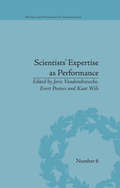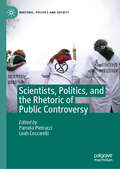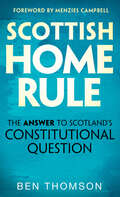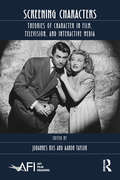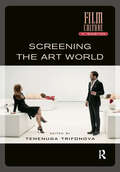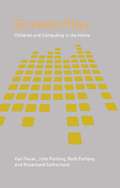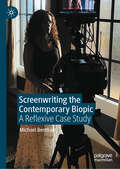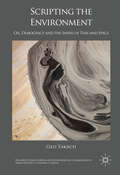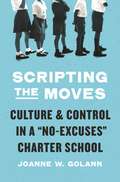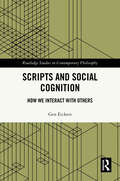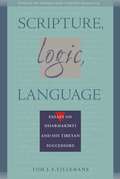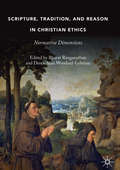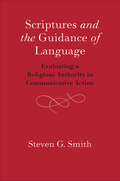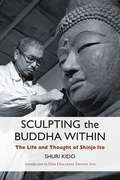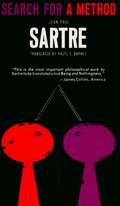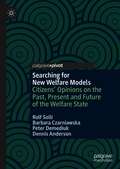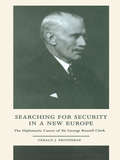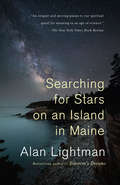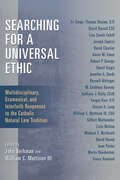- Table View
- List View
Scientists' Expertise as Performance: Between State and Society, 1860–1960 (History and Philosophy of Technoscience #6)
by Joris Vandendriessche Evert Peeters Kaat WilsThe essays in this collection explore our reliance on experts within a historical context and across a wide range of fields, including agriculture, engineering, health sciences and labour management. Contributors argue that experts were highly aware of their audiences and used performance to gain both scientific and popular support.
Scientists, Politics, and the Rhetoric of Public Controversy (Rhetoric, Politics and Society)
by Leah Ceccarelli Pamela PietrucciThis book examines how scientists around the world embrace their responsibility as citizens, and how science is being used and abused by non-scientists in public spaces. As right-wing politicians, conspiracy theorists, and modern robber barons assault science in the current moment, it is time for the rhetoric of science to reconceptualize itself as a crisis/care discipline. The essays in this volume help us do that by scrutinizing particular cases of science activism, examining the public modalities of resistance that scientists are increasingly taking up as they modify their public engagement to fit evolving rhetorical situations. These essays also reveal how the authority of science is being distorted and exploited by non-experts in ways that are more dangerous than ever in the shadow of climate change and global pandemics. The book ends with a look at new possibilities for collaboration between local communities and scientists and a reflection on how a rhetorical conception of ethos can help us comprehend the negotiation of asymmetries between experts and laypeople in the current era.
Scopri il tuo potere: l'universo dentro di te
by Gautam SharmaLa consapevolezza dell'ego e la connessione al campo unificato. ...essere amati per se stessi ed essere apparentemente separati dal proprio stato originale di consapevolezza e dal campo unificato, ha proporzioni spirituali talmente profonde che, sin dalla prima infanzia si innescano dei processi in aree strategiche del cervello tali da provocare uno squilibrio e la dominanza, oltre alla negazione, alla sfiducia, al trascurare la nostra connessione al campo unificato e l'amore e la gioia e uno stato di consapevolezza spirituale ancora più profondo dentro di noi
Scottish Home Rule: The Answer to Scotland's Constitutional Question
by Ben ThomsonA proponent of Scottish Home Rule offers a clear and concise introduction to the merits of the policy and the history of the movement. Every debate about the Scottish constitution should include the topic of Scottish Home Rule, and if there is to be another referendum in Scotland then Home Rule should be one of the options on the ballot paper. Yet, for all its importance, Home Rule is not widely understood. The proposal is seen by many Unionists as the slippery slope to Independence. Meanwhile, Independence supporters regard it as a Unionist proposal to retain sovereignty over Scotland. It is however a strong proposal in its own right, with a separate history from Independence and a more likely steppingstone to Federalism. This book lays out the merits of Scottish Home Rule as the best solution for Scotland. It covers the history of support for the Home Rule option since 1860s, a clear outline of how it works, and a discussion about how it could both improve Scotland and act as a framework for constitutional reform across the UK.
Screened Out
by Jean Baudrillard Chris Turner'Watching the president's Christmas message produces this necropolar, white-mass sensation. Seeing the video broadcast of the Christmas service in the cathedral itself, with these pathetic screens and the young worshippers slumped around them here and there, you tell yourself that God and religion deserved better. Deserved to die, yes, but not this. However, watching the presidential figure and his sonorous inanity, you tell yourself that here at least you got what you deserved. Chirac is useless - that goes without saying - but so are we all ... Uselessness of this kind has no origin: it exists immediately, reciprocally; like a shared secret, you savour it implicitly - with its warm bitterness - particularly in these cold snaps, as the very essence of the social bond. Sanctioned by that other interactive uselessness - the uselessness of the screen.'World-renowned for his lively and often iconoclastic reading of contemporary culture and thought, Jean Baudrillard here turns his hand to topical political debates and issues. In this stimulating collection of journalistic essays Baudrillard addresses subjects ranging from those already established as his trademark (virtual reality, Disney, television) to more unusual topics such as the Western intervention in Bosnia, children's rights, Holocaust revisionism, AIDS, the Rushdie fatwa, Formula One racing, mad cow disease, genetic cloning, and the uselessness of Chirac. These are coruscating and intriguing articles, not least because they show that Baudrillard is - pace his critics - still susceptible and alert to influences from social movements and the world beyond the hyperreal.
Screening Characters: Theories of Character in Film, Television, and Interactive Media (AFI Film Readers)
by Johannes Riis Aaron TaylorCharacters are central to our experiences of screened fictions and invite a host of questions. The contributors to Screening Characters draw on archival material, interviews, philosophical inquiry, and conceptual analysis in order to give new, thought-provoking answers to these queries. Providing multifaceted accounts of the nature of screen characters, contributions are organized around a series of important subjects, including issues of class, race, ethics, and generic types as they are encountered in moving image media. These topics, in turn, are personified by such memorable figures as Cary Grant, Jon Hamm, Audrey Hepburn, and Seul-gi Kim, in addition to avatars, online personalities, animated characters, and the ensembles of shows such as The Sopranos, Mad Men, and Breaking Bad.
Screening the Art World (Film Culture in Transition)
by Temenuga TrifonovaScreening the Art World explores the ways in which artists and the art world more generally have been represented in cinema. Contributors address a rarely explored subject – art in cinema, rather than the art of cinema – by considering films across genres, historical periods, and national cinemas in order to reflect on cinema's fluctuating imaginary of art and the art world. The book examines the intersection of art history with history in cinema; cinema’s simultaneous affirmation and denigration of the idea of art as truth; the dominant, often contradictory ways in which artists have been represented on screen; and cinematic representations of the art world's tenuous position between commercial good and cultural capital.
Screenplay: Children and Computing in the Home
by John Furlong Rosamund Sutherland Keri Facer Ruth FurlongWhat are young people really doing on computers at home?Computers feature heavily in the lives of today's young people, and this book sets out to question commonplace assumptions about the use of technology by children at home. Bringing together research from the perspective of psychology, sociology, education and media studies, the authors ask whether we are really witnessing the rise of a new 'digital generation'.Drawing upon the results of their in-depth research project, the authors filter and assess their findings accessibly, offering fascinating reading on:* how computers are used in the home* how parents and children negotiate access to and use of the computer* what role the computer plays in the day to day lives of families.This book makes use of illuminating case studies, and highlights key issues of concern around issues of equality and access in a wider social context. This truly interdisciplinary perspective will be instrumental in reshaping the understanding of teachers, ICT advisors, policy makers and all involved in ICT for children.
Screenwriting the Contemporary Biopic: A Reflexive Case Study
by Michael BenthamThis book explores the intricate challenges screenwriters face when balancing fact and fiction in biopics. As biopics have become synonymous with prestige and award-worthiness in contemporary cinema, they also attract intense scrutiny for their handling of historical facts. The allure of the biopic lies in its ability to use fiction to delve into the interiority of its subjects, yet this raises ethical questions about historical fidelity and narrative truth. What obligations does the phrase "based on a true story" impose on screenwriters? Can a biopic truly capture the essence of its subject, or does it inherently distort reality? Through a self-reflexive case study of a screenplay about British boxer Randolph Turpin, this book seeks to answer these pressing questions. It examines the process of transforming extensive research into a compelling narrative, offering insights into the delicate balance between truth and fiction. By bridging the gap between theory and practice, this work provides a fresh perspective on the biopic genre. Ideal for scholars in screenwriting and film studies, industry professionals, and students of screen production, this book offers a deeper understanding of how biopics reveal truths about historical figures and events.
Scripting the Environment: Oil, Democracy and the Sands of Time and Space (Palgrave Studies in Media and Environmental Communication)
by Geo TakachThis volume explores how to engage audiences both beyond and within the academy more deeply in environmental research through arts-based forms. It builds on a multi-pronged case study of scripts for documentary film, audio-visual and stage formats, focusing on how the identity of a place is constructed and contested in the face of environmental concerns around fossil-fuel extraction in a globalized, visual society--and specifically on the rising, international public-relations war over Alberta’s stewardship of the tar sands. Each script is followed by discussion of the author’s choices of initiating idea, research sources, format, voices, world of the story, structure and visual style, and other notes on the convergence of synthesis, analysis and (re)presentation in the script. Included are lively analysis and commentary on screenwriting and playwriting theory, the creation and dissemination of the scripts, and reflections to ground a proposed framework for writing eco-themed scripts for screen, audio-visual and stage formats.
Scripting the Moves: Culture and Control in a "No-Excuses" Charter School
by Joanne W. GolannAn inside look at a "no-excuses" charter school that reveals this educational model’s strengths and weaknesses, and how its approach shapes studentsSilent, single-file lines. Detention for putting a head on a desk. Rules for how to dress, how to applaud, how to complete homework. Walk into some of the most acclaimed urban schools today and you will find similar recipes of behavior, designed to support student achievement. But what do these “scripts” accomplish? Immersing readers inside a “no-excuses” charter school, Scripting the Moves offers a telling window into an expanding model of urban education reform. Through interviews with students, teachers, administrators, and parents, and analysis of documents and data, Joanne Golann reveals that such schools actually dictate too rigid a level of social control for both teachers and their predominantly low-income Black and Latino students. Despite good intentions, scripts constrain the development of important interactional skills and reproduce some of the very inequities they mean to disrupt.Golann presents a fascinating, sometimes painful, account of how no-excuses schools use scripts to regulate students and teachers. She shows why scripts were adopted, what purposes they serve, and where they fall short. What emerges is a complicated story of the benefits of scripts, but also their limitations, in cultivating the tools students need to navigate college and other complex social institutions—tools such as flexibility, initiative, and ease with adults. Contrasting scripts with tools, Golann raises essential questions about what constitutes cultural capital—and how this capital might be effectively taught.Illuminating and accessible, Scripting the Moves delves into the troubling realities behind current education reform and reenvisions what it takes to prepare students for long-term success.
Scripts and Social Cognition: How We Interact with Others (Routledge Studies in Contemporary Philosophy)
by Gen EickersThis book argues that our success in navigating the social world depends heavily on scripts. Scripts play a central role in our ability to understand social interactions shaped by different contextual factors.In philosophy of social cognition, scholars have asked what mechanisms we employ when interacting with other people or when cognizing about other people. Recent approaches acknowledge that social cognition and interaction depend heavily on contextual, cultural, and social factors that contribute to the way individuals make sense of the social interactions they take part in. This book offers the first integrative account of scripts in social cognition and interaction. It argues that we need to make contextual factors and social identity central when trying to explain how social interaction works, and that this is possible via scripts. Additionally, scripts can help us understand bias and injustice in social interaction. The author’s approach combines several different areas of philosophy – philosophy of mind, social epistemology, feminist philosophy – as well as sociology and psychology to show why paying attention to injustice in interaction is much needed in social cognition research, and in philosophy of mind more generally.Scripts and Social Cognition: How We Interact with Others will appeal to scholars and graduate students working in philosophy of mind, philosophy of psychology, social epistemology, social ontology, sociology, and social psychology.
Scripture, Logic, Language
by Tom J. Tillemans E. Gene SmithDharmakirti, an Indian Buddhist philosopher of the seventh century, explored the nature, limits, and justifications of rationality within the context of Buddhist religious and metaphysical concerns. While Dharmakirti is widely recognized for his crucial innovations in Indian logic and semantic theory, his notoriously difficult thought nonetheless remains poorly understood. In this volume, one of the world's leading scholars of Buddhist philosophy sheds light on the interrelated topics of scripture, logic, and language in the works of Dharmakirti and his philosophical heirs, both Indian and Tibetan. Professor Tillemans' knowledgeable explanations of such technical subjects as the apoha theory of reference and the problem of entailment (vyapti) are coupled throughout with insightful reflections on how best to evaluate Dharmakirti's theories in light of contemporary philosophical thought. Scripture, Logic, Language is an informative and thought-provoking study for students of Buddhism as well as for those in the wider field of philosophy.
Scripture, Tradition, and Reason in Christian Ethics: Normative Dimensions
by Bharat Ranganathan Derek Alan Woodard-LehmanHow should we understand the relationship between Christian ethics and religious ethics? Among comparative, ethnographic, and normative methodologies? Between confessional and non-confessional orientations, or between theology and philosophy? This volume brings together emerging religious ethicists to engage the normative dimensions of Christian ethics. Focusing on scripture, tradition, and reason, the contributors to this volume argue for a vision of Christian ethics as religious ethics. Toward this end, they engage with scripture, interpretation, and religious practice; examine the putative divide between reason and tradition, autonomy and heteronomy; and offer proposals about the normative characterization of conceptual and practical issues in contemporary religious ethics. Collectively, the volume engages Christian thought to make an argument for the continuing relevance of normative methodologies in contemporary religious and theological ethics.
Scriptures and the Guidance of Language: Evaluating a Religious Authority in Communicative Action
by Steven SmithIn this book, Steven G. Smith focuses on the guidance function in language and scripture and evaluates the assumptions and ideals of scriptural religion in global perspective. He brings to language studies a new pragmatic emphasis on the shared modeling of life-in-the-world by communicators constantly depending on each other's guidance. Using concepts of axiality and axialization derived from Jaspers' description of the 'Axial Age', he shows the essential role of scripture in the historical progress of communicative action. This volume clarifies the formative power of scriptures in religions of the 'world religion' type and brings scripture into philosophy of religion as a major cross-cultural category of study, thereby helping philosophy of religion find a needed cross-cultural footing.
Scrutinising Elites and Schooling in Post-Communist Poland: Globalisation, European Integration, Socialist Heritage, and Tradition (Routledge Research in Education)
by Alexandra Margaret DunwillThis book offers new insights and methodological tools to improve our understandings of how prestigious schools in Poland navigate the major political, social and cultural crosscurrents. The range of choice for elite schooling in Poland has expanded during its post-communist transformation. However, while elite education in countries such as the US, Australia, UK, France, and Switzerland has been extensively studied, post-communist countries have been largely neglected. This book explores the emergence of such schools within a context influenced by a range of different and often conflicting social forces. In doing so, the study elucidates how the socio-historical processes since 1989 diversified Poland’s egalitarian education system and facilitated the emergence of schools for elites. The book demonstrates that social and political changes in Poland triggered the emergence of new elites with different political and social outlooks, leading to a variety of types of elite schools that reflect and reproduce the elites’ positions and idiosyncrasies. A bespoke theoretical arrangement scrutinises extant and generated data from elite schools’ websites, online readers’ forums, and interviews with elite school principals. The book contributes new insights into elite schools in Central and Eastern European (CEE) countries, enriching the existing body of knowledge on elites and elite schools around the world. It will be of interest to researchers and postgraduate students investigating elite education, sociology of education, education policy, and education and international development.
Sculpting the Buddha Within: The Life And Work Of Shinjo Ito
by Shuri KidoThe definitive biography of Shinjo Ito, the founder of one of the main traditions of Buddhism, which has almost 1 million members worldwide.This is the first major biography of Shinjo Ito, the founder of the Shinnyo-en tradition of Buddhism and one of the twentieth century’s most innovative spiritual teachers. Shinjo was schooled in the millennium-old esoteric Buddhism of Japan, and used that as the basis for developing a unique lay practice grounded in the principles and concepts of the Mahayana version of the Nirvana Sutra. Sculpting the Buddha Within is an important book that traces Shinjo Ito’s evolution not only as a spiritual master but also as a human being. Living in a time of unprecedented change, Shinjo Ito’s personal life was often marked by hardships and personal grief, experiences that became the foundation for cultivating universal compassion. Committed to making buddhahood tangible for others and a goal worth aspiring to, Shinjo Ito also excelled as a sculptor of devotional images. His wish was to help his practitioners see their own potential for goodness so that they, too, would want to work diligently to shape and give form to their inner buddha. Rather than encouraging his followers to believe in a fixed system of practice or beliefs, Shinjo Ito taught how to live life in accordance with one’s buddha nature—and the gratitude, creativity, and happiness latent within it.
Sea Libre Donde Esté: Una guía práctica para vivir con plena consciencia
by Thich Nhat HanhFreedom is not given to us by anyone; we have to cultivate it ourselves. This compendium of the core teachings of Thich Nhat Hanh, based on a talk given at a prison, shows how mindfulness practice can cultivate freedom no matter where you are.
Sea libre donde esté
by Thich Nhat Hanh Sister Chan KhongThis is the Spanish language ebook of Be Free Where You Are. Based on talks Thich Nhat Hanh gave to prisoners at Maryland State Penitentiary. An enjoyable and accessible meditation guide covering essentials such as conscious breathing, sitting meditation, walking meditation, the practice of silence, and performing daily activities in mindfulness.
Search After Happiness
by Swami RamakrishnanandaSearch After Happiness by Swami Ramakrishnananda is a profound collection of lectures originally delivered between 1893 and 1911, exploring the eternal quest of human beings for peace, happiness, and self-realization. Drawing upon Vedantic philosophy and the teachings of Sri Ramakrishna, the book addresses fundamental questions such as “Who am I?”, “What is the soul?”, and the relationship between the finite and the infinite. It explains the illusory nature of worldly desires, the role of mind and maya, and the path to true freedom through self-knowledge, renunciation, and devotion to God. This revised edition consolidates earlier works, offering seekers timeless wisdom on overcoming restlessness, realizing the true Self, and attaining lasting happiness and peace.
Search for a Method
by Jean-Paul Sartre Hazel E. Barnes'Search for a Method' is a separate and introductory essay published together with 'Critique of Dialectical Reason'. It is the search for a method by which the existentialist Marxist may hope to understand both individual persons and history.
Searching for New Welfare Models: Citizens' Opinions on the Past, Present and Future of the Welfare State
by Dennis Anderson Barbara Czarniawska Rolf Solli Peter DemediukThis book explores the ways in which different generations think about how the welfare state is organised at present, and how it will be organised in future. Using the results of a study from Canada, Australia and Sweden, the book’s findings complement more traditional studies of the welfare sector, capturing the anxieties of citizens about the present and future of their countries’ welfare models, and presenting their thoughts on how the system can be re-organised in future. Positioning their three-country study within the history of the welfare state around the world, the authors seek to re-assess the role of the welfare state in governments around the world. Their findings will be of interest to those studying welfare policy as well as innovations such as basic income, e-health and policy responses to automisation.
Searching for Security in a New Europe: The Diplomatic Career of Sir George Russell Clerk (British Politics and Society)
by Gerald J. ProtheroeDrawing on an array of archival material, this study sheds light on Sir George Russell Clerk, an important, yet forgotten figure in British and European diplomatic history. During the First World War, Clerk was a senior Foreign Office official strongly sympathetic to the cause of the 'oppressed nationalities' of the Austro-Hungarian Empire. This biographical study focuses on the most significant part of Clerk’s career, his role as a nation-builder in post-war Europe until his eventual downfall at the hands of Antony Eden, and retirement in 1937. This is an excellent account of the thoughts and deeds of a remarkable man in British History.
Searching for Stars on an Island in Maine
by Alan LightmanFrom the acclaimed author of Einstein's Dreams, here is an inspires, lyrical meditation on religion and science that explores the tension between our yearning for permanence and certainty, and the modern scientific discoveries that demonstrate the impermanent and uncertain nature of the world. <P><P>As a physicist, Alan Lightman has always held a scientific view of the world. As a teenager experimenting in his own laboratory, he was impressed by the logic and materiality of a universe governed by a small number of disembodied forces and laws that decree all things in the world are material and impermanent. <P><P>But one summer evening, while looking at the stars from a small boat at sea, Lightman was overcome by the overwhelming sensation that he was merging with something larger than himself—a grand and eternal unity, a hint of something absolute and immaterial. <P><P> Searching for Stars on an Island in Maine is Lightman's exploration of these seemingly contradictory impulses. He draws on sources ranging from Saint Augustine's conception of absolute truth to Einstein's theory of relativity, from the unity of the once-indivisible atom to the multiplicity of subatomic particles and the recent notion of multiple universes. <P><P>What he gives us is a profound inquiry into the human desire for truth and meaning, and a journey along the different paths of religion and science that become part of that quest.
Searching for a Universal Ethic: Multidisciplinary, Ecumenical, and Interfaith Responses to the Catholic Natural Law Tradition
by John Berkman William C. Mattison IIIThe best contemporary English-language resource on pursuing a universal ethics In this volume twenty-three major scholars comment on and critically evaluate In Search of a Universal Ethic, the 2009 document written by the International Theological Commission (ITC) of the Catholic Church. That historic document represents an official Church contribution both to a more adequate understanding of a universal ethic and to Catholicism’s own tradition of reflection on natural law. The essays in this book reflect the ITC document’s complementary emphases of dialogue across traditions (universal ethic) and reflection on broadly applicable ethical guidance within the Christian tradition (natural law). Among other things, the document situates the natural law ethical tradition within the larger search for a universal ethic. Along with its insightful essays, Searching for a Universal Ethic offers — for the first time in published form — the Vatican’s official English translation of In Search of a Universal Ethic.Contributors:John BerkmanSerge-Thomas Bonino, O.P.David Burrell, C.S.C.Lisa Sowle CahillJoseph E. CapizziDavid CloutierAnver M. EmonRobert P. GeorgeSherif GirgisJennifer A. HerdtRussell HittingerM. Cathleen KavenyAnthony J. Kelly, C.Ss.R.Fergus Kerr, O.P.Steven A. LongWilliam C. Mattison IIIGilbert MeilaenderLivio MelinaMichael S. NorthcottDavid NovakJean PorterMartin RhonheimerTracey Rowland
